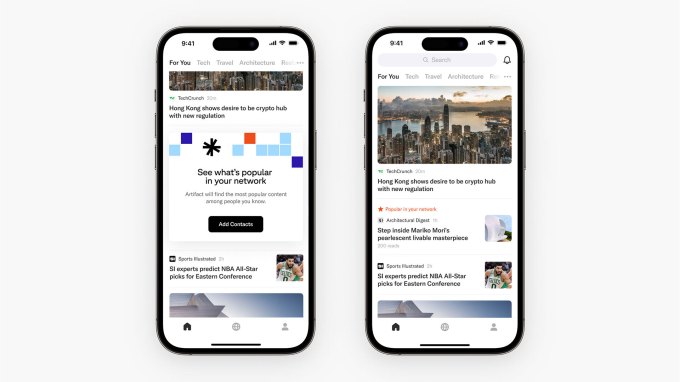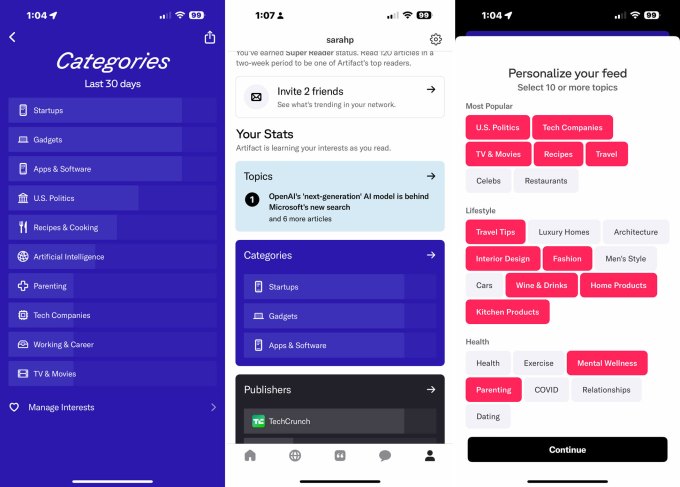Artifact, the personalized news reader built by Instagram’s co-founders, is now open to the public, no sign-up required. Last month, Instagram’s creators Kevin Systrom and Mike Krieger, unveiled their latest venture as an invite-only experience, promising their news app would later evolve to include social elements, like being able to discuss the news with friends. With today’s launch, Artifact is dropping its waitlist and phone number requirements, introducing the app’s first social feature and adding feedback controls to better personalize the news reading experience, among other changes.
When Artifact first emerged in January, the app required a phone number and an invite to try out, which drove initial demand. But it also kept the app out of the hands of many potential users in the near term — the company says the waitlist included around 160,000 sign-ups. Even with an invite, users outside the U.S. couldn’t necessarily try Artifact, because the sign-up required a U.S. phone number.
That all goes away today, as Artifact will be instantly usable upon first launch. In fact, you’ll not need to enter a phone number at all, unless you want to create an account to port Artifact to a new device.
Systrom explains the delay in launching publicly was not just about generating consumer interest in the Instagram founders’ next big thing, but also because the underlying technology requires a certain amount of data and a number of people using it to offer the best experience. As a few weeks have now passed, the company believes the app is ready for a larger audience.

With today’s launch, Artifact will now give users more visibility into their news reading habits with a newly added stats feature that shows you the categories you’ve read as well as the recent articles you read within those categories, plus the publishers you’ve been reading the most. But it will also group your reading more narrowly by specific topics. In other words, instead of just “tech” or “AI,” you might find you’ve read a lot about the topic “ChatGPT,” specifically.
In time, Artifact’s goal is to provide tools that would allow readers to click a button to show more or less from a given topic to better control, personalize and diversify their feed. In the meantime, however, users can delve into settings to manage their interests by blocking or pausing publishers or selecting and unselecting general interest categories.
Also new today is a feature that allows you to upload your contacts in order to see a signal that a particular article is popular in your network. This is slightly different from Twitter’s Top Articles feature, which shows you articles popular with the people you follow, because Artifact’s feature is more privacy-focused.
“It doesn’t tell you who read it. It doesn’t tell you how many of them read it, so it keeps privacy — and we clearly don’t do it with just one read. So you can’t have one contact and like figure out what that one contact is reading…it has to meet a certain minimum threshold,” notes Systrom.
This way, he adds, the app isn’t driven by what your friends are reading, but it can use that as a signal to highlight items that everyone was reading. In time, the broader goal is to expand the social experience to also include a way to discuss the news articles within Artifact itself. The beta version, limited to testers, offers a Discover feed where users can share articles and like and comment on those shared by others. There’s a bit of a News Feed or even Instagram-like quality to engaging with news in this way, we found.
Instagram’s co-founders introduce a new social app…for news reading
The launch of a brand-new app from Instagram’s founders, and particularly one focused on news, was a surprise — especially given the difficulties of launching a news reader here in the U.S., where it would have to compete with offerings from the tech giants, like Google News, Apple News and, of course — from the founders’ earlier employer — Meta’s own News Feed. The latter evolved over the years from just a stream of friends’ updates to deliver news and information, and arguably misinformation, to billions of users. According to data from Pew Research, around one-third of U.S. adults get their news regularly from Facebook, presenting a challenge to any new startup in the news market.
Meanwhile, Artifact comes across as something like a U.S.-based version of something like China’s Toutiao or Japan’s SmartNews, both of which leverage algorithms and machine learning technology to create a curated set of news articles for each user based on how they engage with the app’s content.
However, Systrom argues that while Artifact is similar to these other personalized news readers in the sense that they’re all using machine learning technologies to deliver their curated selection of news to individual users, the “devil is in the details” here.
“The machine learning that a lot of what we’re doing is based on was invented in 2017 at Google. It’s called the transformer,” says Systrom. (That’s the “T” in ChatGPT, by the way.) “Without that, GPT-3, 3.5, etc. wouldn’t exist. Without that, you wouldn’t have DALL-E. Without that, you wouldn’t have ChatGPT,” he explains. “So what we’re starting to see, I think, this rise in applications of this core technology, the transformer.”
In other words, new technology creates a market for new apps to emerge that may in some ways resemble their predecessors, but differentiate themselves by how they’re leveraging what’s under the hood.
Systrom compares this opportunity to the founding of Instagram, noting that there were already other image-sharing apps available when it emerged.
“When we built Instagram, the iPhone 4 had just launched and we were so excited about the processing speed and also about the camera being just good enough. There was this breaking point…We happened to stand out from the crowd because we had a couple of differentiating features and we timed it correctly,” Systrom says. “We are certainly betting on that thesis [with Artifact] — which is that the technology is different.”

For Artifact, the differentiating features won’t just be the machine learning tech, but also the social features built by founders who built one of the most popular social apps to date, as well as personalization tools designed to help improve the experience with more explicit feedback.
Today, Artifact curates news from hand-selected, higher-quality publishers across categories who meet certain criteria around integrity — like their fact-checking and corrections process and transparency around funding, along with other factors. That means they’re not necessarily right or left-leaning sites, the company notes. Plus, as you dive into a topic, readers are shown a span of headlines about the same subject in an effort to pop any so-called “filter bubbles” and present a broader viewpoint.
The more you interact with the app, it learns what particular news is of interest to you, by weighing clicks, dwell time, read time and other signals, like whether you shared the feed with friends and more. Over time, the social feeds will emerge and Artifact will not just personalize news and deliver your interests, but also provide a place to discuss those topics. But the accompanying moderation headaches that come with that experience aren’t something the company’s seven-person team is ready to face just yet.
Based in San Francisco with some remote team members, Artifact is currently self-funded by the founders to the tune of “single-digit millions.” It has five Instagram vets on staff, including Robby Stein, as its head of product and the founders. This year, the company aims to roll out more features to better convince consumers of its larger thesis — that this is not just another Toutiao, it has something new to offer.
“What you should expect from Artifact over the next year is, I think, divergence from the norm. I think people will be happily surprised that there was, in fact, a lot of room for innovation around news and publishing,” Systrom says.
Artifact is available across most English-speaking App Stores and on Android.































Comment